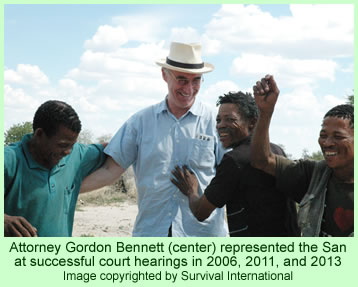The G/wi and the other San peoples are once again heading into court to appeal repression, but this time the government of Botswana is exerting its authority. It has barred their English lawyer from entering the country. News stories in Africa last week and abroad have criticized the most recent action.
 The government of Botswana put Gordon Bennett, an English attorney, on what is called their “visa list.” English people normally don’t have to apply for visas in advance to travel to Botswana, but this latest move appears to be a way for the government to prevent him from returning to the country and serving as an attorney for the San peoples.
The government of Botswana put Gordon Bennett, an English attorney, on what is called their “visa list.” English people normally don’t have to apply for visas in advance to travel to Botswana, but this latest move appears to be a way for the government to prevent him from returning to the country and serving as an attorney for the San peoples.
Mr. Bennett represented the G/wi and the other San societies when they won their appeal in Botswana’s High Court in 2006. The government had forcibly moved the G/wi to resettlement camps despite their having the legal right to live in the Central Kalahari Game Reserve (CKGR), which had been guaranteed in writing since the British controlled the country.
Under Mr. Bennett’s leadership, the San appeal was approved by the High Court in November that year. The San no longer needed to have a permit from the government to enter the CKGR, the court ruled. The ruling was historic, probably the first in Africa to affirm land titles for a minority indigenous people.
In 2011, again with Mr. Bennett serving as the lead attorney, the San won the right to drill for water on their lands. Since it couldn’t stop the people from entering their homelands, the government had changed its strategy and had sought to prevent them from having access to water. The Botswana Court of Appeals heard that case, and again the G/wi and their allies won. They now have the right to drill wells.
In another San issue this year, one that is outside the boundaries of the CKGR, the government of Botswana sought to expel a San community from their homes in the community of Ranyane in the southwestern section of the nation. Mr. Bennett represented them in a court hearing in June, and once again his side prevailed over the government. Six days later, the government put him on the “visa list.”
This is causing problems for the CKGR San people, including the G/wi, who won that historic court decision of 2006. Despite the wording of the 2006 ruling, and the fact that the government had acknowledged at the start of the court proceedings in 2002 that it would apply to about 700 San people, the government subsequently claimed that only the 189 people who were signatories to the court case would be allowed to enter the CKGR without hassles.
All other San must apply for permits to enter. Those documents are issued for only one month at a time, and the San live in constant fear that government agents—wildlife scouts and paramilitary police—will arrest them for overstaying their permits. So the San scheduled another appearance in court for Monday, July 29, to appeal the government’s refusal to drop their restrictions on people living in the CKGR.
Mr. Bennett applied for a visa, but the Botswana authorities have used a variety of delaying tactics to prevent him from entering the country. It clearly wanted to delay him until after the 29th. Mr. Bennett’s comments last Thursday, reported by a release from Survival International (SI), are worth quoting in full.
“The right to a fair trial normally includes the right to be represented by counsel of your choice. Not in Botswana, apparently—or at least not if you sue the Government. Most of us would struggle to understand why one party to a legal action should ever be allowed to deprive the other of the counsel he has chosen, but the Government sees no problem. It does not even think it necessary to explain itself. Not a good day for the rule of law in Botswana.”
In reaction to this latest news, Jumanda Gakelebone, a prominent San activist, told SI, “it has never been our will to go to court, but the repression, evictions, harassment, and torture carried out by the Botswana government have forced us to talk to them in court.”
The director of Survival International, Stephen Corry, echoed these observations. “This is yet another calculated move by President [Ian] Khama to thwart the Bushmen’s access to justice,” he said. “It’s ironic that Botswana is still thought to be ‘transparent’ and ‘democratic’ when its government has spent years trying to destroy its original peoples. Now, after their successes in court, Bushmen are not even allowed their lawyer. This is a vindictive and repressive step.”
The judge in Monday’s court hearing reserved judgment about the case.